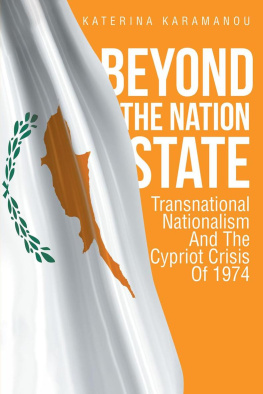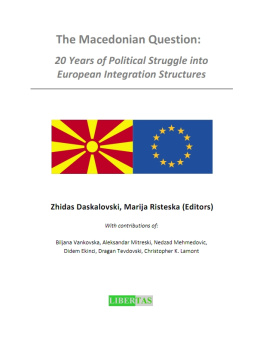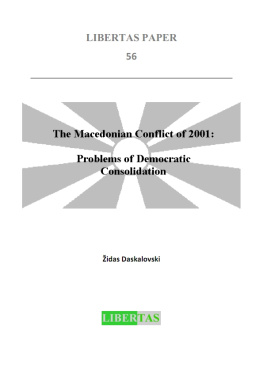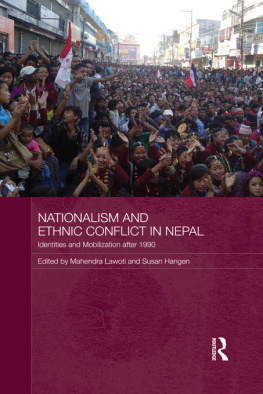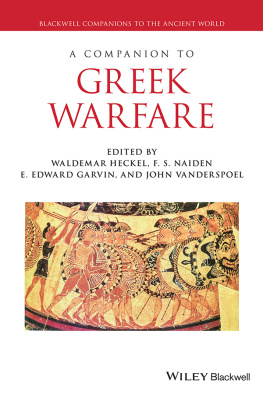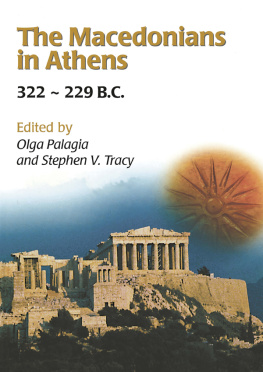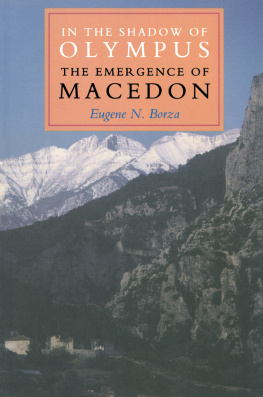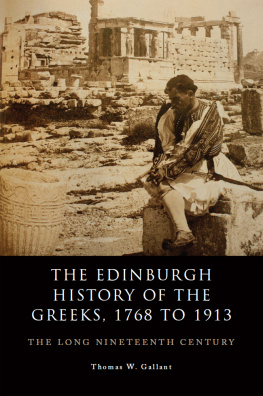Copyright 1995 by Princeton University Press
Published by Princeton University Press, 41 William Street,
Princeton, New Jersey 08540
In the United Kingdom: Princeton University Press,
Chichester, West Sussex
All Rights Reserved.
Library of Congress Cataloging-in-Publication Data
Danforth, Loring M., 1949
The Macedonian conflict: ethnic nationalism in a
transnational world / Loring M. Danforth.
Includes bibliographical references and index.
ISBN 0-691-04357-4 (cl: alk. paper)
eISBN 978-0-691-22171-7
1. MacedoniaEthnic relations. 2. GreeceEthnic relations.
3. AustraliaEthnic relations. 4. NationalismMacedonia.
5. NationalismGreece. 6. MacedoniaName. 7. Macedonians
Australia. 8. GreeksAustralia. 9. ImmigrantsAustralia.
I. Title.
DR2173.D36 1995
949.56dc20 95-13319 CIP
ISBN-13: 978-0-691-04356-2 (pbk.)
ISBN-10: 0-691-04356-6 (pbk.)
R0
Preface
MY FIRST introduction to the controversial subject of ethnic identity in northern Greece occurred in 197576 while I was doing fieldwork as a graduate student in a village near Serresa village inhabited by Thracian refugees and local Macedonians. When I spoke to a Greek folklorist in Athens about the local Macedonians who lived in this village, he replied firmly that there were no Macedonians in Greece, only Slavophone Greeks. I did not fully understand the significance of his comment then. I understand it much better now.
An invitation to participate in the First International Congress on Macedonian Studies in Melbourne, Australia, in 1988 changed the course of my scholarly career and led me to focus my research for the next six years on the Macedonian conflict. A primary goal of this conference, which was simultaneously one of the most ethnographically interesting and ethically troubling experiences in my career, was to assert the essential Greekness of Macedonia and refute the propaganda of the Slavs who were attempting to distort history by claiming that they were the real Macedonians. The Macedonian community of Melbourne mounted a protest against this conference in order to defend the rights of Macedonians in multicultural Australia. After witnessing firsthand both the intensity and the complexity of the conflict between Greeks and Macedonians over which group had the right to identify itself as Macedonian, I decided to return to Australia and investigate the subject further. This book is the result of my investigations.
Given the transnational nature of the Macedonian conflict, my research on it has of necessity been transnational as well. The fieldwork on which this book is based has been carried out in four different countries on three different continents. Throughout my research I have made an effort to work closely with people on both sides of the issue so that I could understand both the Greek and the Macedonian perspectives on the Macedonian conflict.
In June 1989,1 conducted fieldwork at a conference entitled Macedonia: History, Culture, Art, which was held in New York City at Columbia University. I spoke with Greek scholars who participated in the conference as well as with Macedonians who attended it. A year later, in June 1990,1 spent two weeks doing research in the region of Fiorina in northern Greece. I worked primarily with members of the Macedonian human rights movement there, but I also spoke with people who had other, very different points of view. Then in March 1991, I spent a week in Toronto, Canada, where I attended the celebration of Greek Independence Day on March 25, as well as a Macedonian protest march, which was held the same day.
The most important period of fieldwork on which this book is based, however, was carried out in Melbourne, Australia, from September 1991 through July 1992. During this time I spoke with a variety of people in both the Greek and the Macedonian communities thereuniversity professors and construction workers, lawyers and milk bar owners, consular officials and human rights activists, elementary school teachers and high school students. I attended an equally wide range of political, cultural, and community eventsdemonstrations and protest marches, folklore festivals and parades, academic conferences and lectures, and dances, picnics, and barbecues sponsored by village associations of immigrants from northern Greece. In addition, I followed media coverage of the Macedonian conflictin newspapers, on radio, and on televisionand not only in the mainstream Australian media, but also in both the Greek and the Macedonian ethnic media as well. Finally, throughout my fieldwork in Melbourne I listened to, and inevitably participated in, innumerable discussions about ethnic identity in general and Macedonian identity in particular. Given my fluency in Greek and my fairly limited knowledge of Macedonian, my interviews with immigrants from the region of Fiorina were conducted either in Greek or in English. Given the politically charged nature of the topic, I did not use a tape recorder during most of these interviews. I did, however, keep detailed notes during all of them. It is on these notes that the majority of the material presented here is based.
In the six years I have been working on the Macedonian conflict I have benefited from the financial, intellectual, and emotional support of many organizations and many people. I am deeply indebted to them all. The short periods of fieldwork I conducted in New York, Fiorina, and Toronto were supported by Bates College through two Roger C. Schmutz Faculty Research Grants. My year of fieldwork in Melbourne was made possible by a Fulbright Scholar Award, and I am extremely grateful to the Council for International Exchange of Scholars in Washington and the Australian-American Educational Foundation in Canberra for giving me and my family the opportunity to live for a year in Australia. Upon completion of my fieldwork in Melbourne I was able to spend the 199293 academic year writing the first draft of this book thanks to a grant from the National Endowment for the Humanities. Don Harward, Carl Straub, and Martha Crunkleton of Bates College have supported this project by granting me the leaves of absence that have enabled me to complete it. I thank them as well.
During my stay in Melbourne the Department of Anthropology and the Australian Centre at the University of Melbourne graciously served as my hosts, providing me with an office and the other privileges of a Visiting Research Fellow. I would particularly like to thank Roger Just, Douglas Lewis, Homer Le Grand, and Chris Wallace-Crabbe, as well as Howard Nicholas of La Trobe University, for their hospitality and support.
Over the years many friends and colleagues in anthropology, modern Greek studies, Slavic studies, and classics have helped me tremendously in my work on the Macedonian conflict by answering my questions, reading drafts of this book, and helping me avoid at least some of the pitfalls that lay in my path. Many thanks to Gene Borza, Keith Brown, Victor Friedman, Michael Herzfeld, John Iatrides, Gregory Jusdanis, Christina Kramer, and Lillian Petroff. I have also benefited greatly from the advice and support of two other anthropologists who have studied the construction of Macedonian identity in northern Greece and done fieldwork in the Fiorina area: Riki van Boeschoten, who participated with me in the 1988 conference in Melbourne and worked with me in Fiorina in 1990, and Anastasia Karakasidou, who as a result of her research on the Macedonian conflict has been the target of death threats both in Greece and the United States. More than anyone else they can appreciate the frustrations and the rewards of working with a group of people, the Macedonian minority of northern Greece, whose existence the Greek government adamantly denies. Needless to say, I am completely responsible for all the views expressed here on this most controversial of topics.


